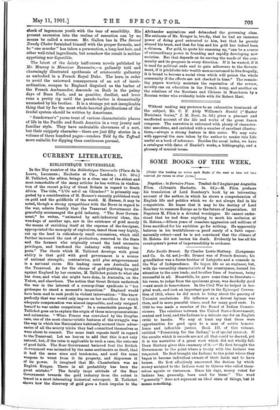CURRENT LITERATURE.
BIBLIOTHRQUE UNIVERSELLE.
In the May number of the RibUotheque Universelle (Place de la Louve, Lausanne ; Hachette et Cie., London ; 2 fr. 50 c.) M. Talliehet, the editor, brings to a close one of the ablest and most remarkable of the many articles he has written in vindica- tion of the recent policy of Great Britain in regard to South Africa. The title, " L'Or est-il un Chimere ? " is primarily sug- gested by a consideration of M. Hauser's recently published work on gold and the goldfields of the world. M. Hauser, it may be noted, though a strong sympathiser with the Boers in regard to the war, admits frankly that the Transvaal Government dis- gracefully mismanaged the gold industry. "The Boer Govern- ment," he writes, "animated by anti-industrial ideas, the wreckage of another age, saw in the existence of gold merely the means of enriching itself at the expense of the foreigner, appropriated the monopoly of explosives, taxed them very highly, cut up the land in ridiculously small concessions, which still further increased the cost of production, reserved to the State and the farmers who originally owned the land excessive privileges, and burdened the industry with crushing im- posts." The thesis which M. Tallichet develops with great ability is that gold with good government is a source of national strength; contrariwise, gold plus misgovernment is a national curse. His leading cases are Australia and the Transvaal. As for the charge of gold-grabbing brought against England by her enemies, M. Tallichet points to what she has done, and what she might have done, in Australia, on the Yukon, and elsewhere. The notion that Great Britain undertook the war in the interest of a cosmopolitan syndicate is "too grotesque to stand a moment's inspection." England would have been mad to seek profit in violent intervention : "She knew perfectly that war would only impose on her sacrifices for which adequate compensation was almost impossible, and only resigned herself to war under compulsion." In a remarkable passage M. Tallichet goes on to explain the origin of these misrepresentations and calumnies. "When France was convulsed by the Dreyfus case, one of the most characteristic features of the struggle was the way in which the Nationalists habitually accused their adver- saries of all the scurvy tricks they bad committed themselves or were about to commit. The same trait repeats itself in regard to the Transvaal. Let me hasten to add that this is not only natural, but, if the term is applicable to such a case, the outcome of good faith. The Boer Government believed tnat the British Government was animated by the same sentiments as itself, that it had the same aims and tendencies, and used the same weapons to wrest from it its property, and dispossess it of its power. It imagined that Mr. Chamberlain was an English Kruger. There in all probability has been the great mistake." The fatally inept attitude of the Boer Government towards the gold industry from the outset is traced in a most interesting historical retrospect. M. Tallichet shows how the discovery of gold gave a fresh impulse to the Afrikander aspirations and debauched the governing class. His estimate of Mr. Kruger is, briefly, that he had an immense power of doing good entrusted to him, but that he grossly abused his trust, and that for him and his gold has indeed been a chimera. For gold, to quote his summing up, "can be a source of extraordinary power in founding and rapidly developing new societies. But that depends on its serving the needs of the com- munity and its progress in every direction. If it be wasted, if it is used for political ends and to gain adherents to the Govern- ment, if it pitchforks into wealth men accustomed to live frugally, it is bound to become a social virus which will poison the whole community if the effects are not checked in time." The remain- ing papers worthily maintain the reputation of the review, notably one on education in the French Army, and another on the relations of the Russians and Chinese in Manchuria by a Russian writer who evidently holds with Sir Robert Hart.






































 Previous page
Previous page